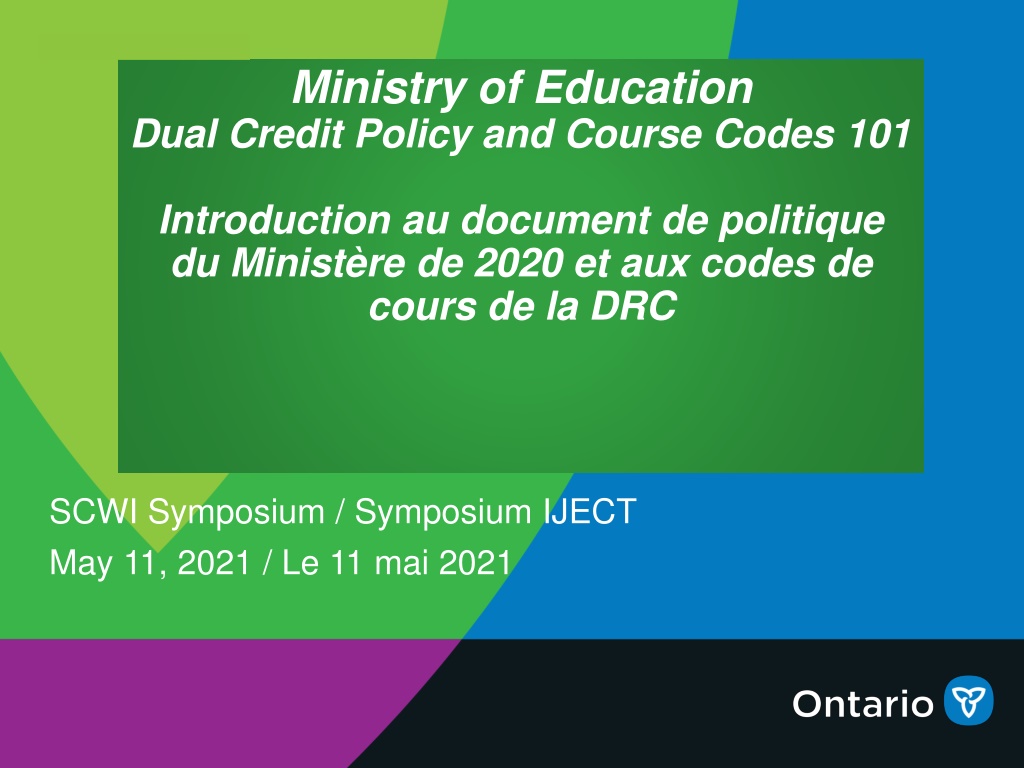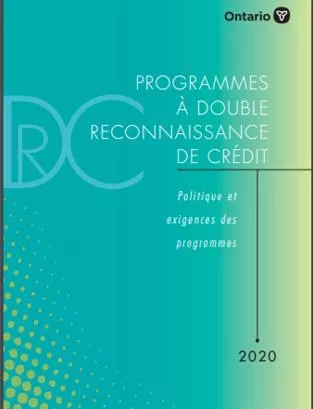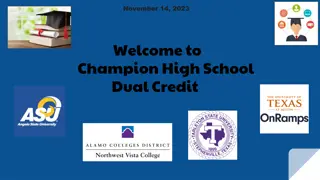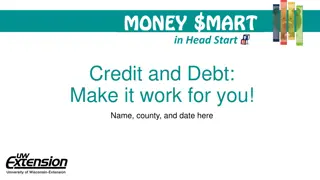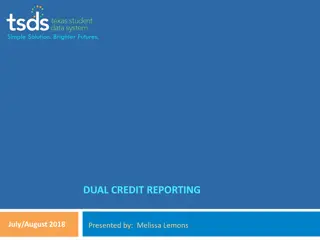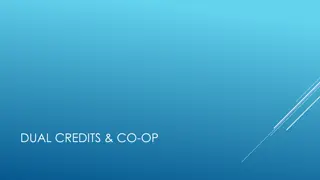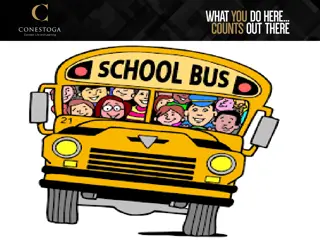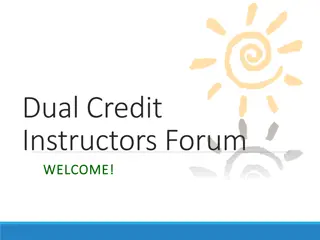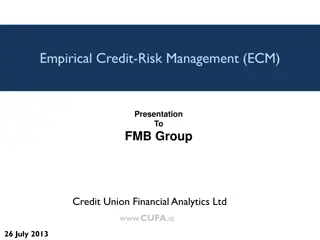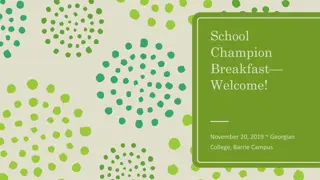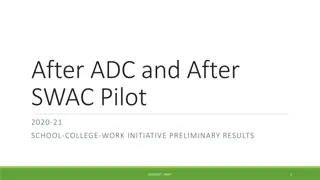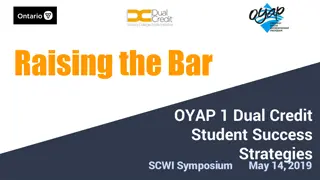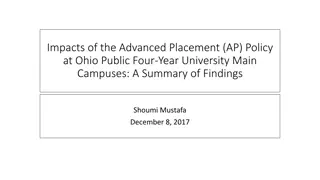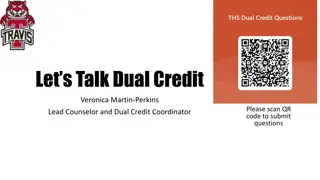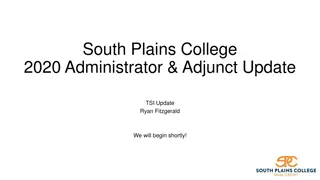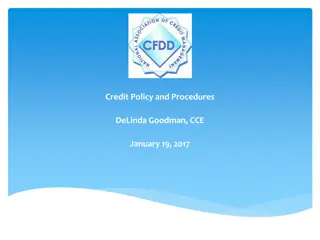Ministry of Education Dual Credit Policy Updates
The Ministry of Education updated its Dual Credit policy document in 2020 to enhance clarity, alignment with program requirements, and understanding of program planning and delivery. Changes cover various aspects including the role of educators and the promotion of post-secondary pathways.
Download Presentation

Please find below an Image/Link to download the presentation.
The content on the website is provided AS IS for your information and personal use only. It may not be sold, licensed, or shared on other websites without obtaining consent from the author. Download presentation by click this link. If you encounter any issues during the download, it is possible that the publisher has removed the file from their server.
E N D
Presentation Transcript
Insert ministry name here Ministry of Education Dual Credit Policy and Course Codes 101 Introduction au document de politique du Minist re de 2020 et aux codes de cours de la DRC SCWI Symposium / Symposium IJECT May 11, 2021 / Le 11 mai 2021
Ministry Dual Credits Policy Document 2020 Le document de politique du Minist re de 2020 WHITEBOARD QUESTION #1 2
Purpose of Policy Updates The Dual Credit policy document was updated in 2020 to align with current program requirements and expectations. Changes provide enhanced clarity and understanding of program planning, delivery and requirements. Changes provide educators as well as ministry staff with enhanced knowledge and clarity of the Dual Credit program. 3
Policy Updates Changes made include but are not limited to Introduction and rationale of the Dual Credit program (p. 3): Focus on re-engagement and succeeding personally and academically . Clearly situating the Educational and Career/Life Planning program at the forefront of students own exploration of post- secondary pathway options. Inclusion of activities and forums as an opportunity for elementary and secondary school students to explore various pathways and learning environments. 4
Policy Updates Role of the secondary school teacher revised to ensure clarity (p. 6, 12): Emphasis on the involvement of a secondary school teacher in all Dual Credit programs; Additional details on specific responsibilities (e.g., adhere to ministry policies, support well-being and achievement). 5
Policy Updates Clarification on difference between school board and college policies (p. 7): Difference in policies and protocols related to criminal reference checks, transportation and emergency procedures and processes. Reference to Creating Pathways to Success, 2013 (p. 10): Dual Credit programs support a school s Education and Career/Life Planning Program. Emphasis on college experience (p. 14): Through a college-delivered course or trip to the college campus. 6
Policy Updates Supports and services for students (p. 21): Before the end of the first class, colleges to inform students of available supports and services. Changes to assessment and withdrawal dates (p. 25): Dual Credit teacher should seek input of college instructor, when possible. Awareness of differences between withdrawal dates of colleges and school boards. 7
Policy Updates Procedure if student exceeds four-credit limit (p. 27): If student earns more than four Dual Credits, student to select four optional college-delivered Dual Credits to include on Ontario Student Transcript. Selection criteria for admission (p. 29): Re-ordered to include three categories at the start of the Appendix. Removal of reference to underachieving and replaced with not meeting their full academic potential . 8
Policy Updates Clarification in Section 3.3: Language of Instruction Protocols for Exceptional Circumstances (p. 21): In exceptional circumstances, a secondary school student in the English-language system may be allowed to enrol in a Dual Credit course of a French-language college, and vice-versa. The same selection criteria apply as for all Dual Credit students. A signed protocol should be in place prior to the start of the course. 9
Policy Updates Clarification in 3.3, Cont d: Please keep the following in mind as you implement: Ultimate goal - that the best option for the student s secondary success and smooth transition to PSE studies be chosen, according to their pathways planning. The Individual Pathways Plan (IPP) is key to the student s planning process. Situation to avoid - student completes the Dual Credit course successfully and cannot have it shown on their report card and transcript as the requirements have not been followed. 10
Policy Updates Clarification in 3.3 - An Example: Student of an English-language school board taking a Dual Credit at a French-language college: The student is counted in the French-language RPT in EDCS. The English-language school board and French-language college receive their benchmark funding from the French- language RPT. The English-language school board is added to the list of participating boards under the Dual Credit program of the French-language RPT in the appropriate change cycle. 11
Policy Updates PClarification -- Partie 3,3 : Un exemple: Quelques astuces, dans le cas d un / d une l ve d une cole secondaire d un conseil scolaire de langue fran aise (CSLF) qui s inscrit un cours DRC d un coll ge de langue anglaise (LA) : L l ve, le CSLF l EPR de LA dans la SACD CSLF r clame son MR de l EPR de LA V rifier politiques et proc dures du conseil de LF 12
Clarification : Exemples l ve d un CSLF qui suit un cours DRC d un coll ge de LA : l ve d un CSLA qui suit un cours DRC d un coll ge de LF : L l ve est compt au sein de l EPR de LA dans la SACD. L l ve est compt au sein de l EPR de LF dans la SACD. Le CSLF et le coll ge de LA re oivent leur montant rep re de l EPR de LA. Le CSLA et le coll ge de LF re oivent leur montant rep re de l EPR de LF. Le CSLF est ajout la liste des conseils participants au programme DRC de l EPR de LA au cycle de changement appropri . Le CSLA est ajout la liste des conseils participants au programme DRC de l EPR de LF au cycle de changement appropri . 13
Any questions? Avez-vous des questions? 14
Dual Credits Course Codes 101 Introduction aux codes de cours de la DRC Poll Qs #1 & #2 15
Whiteboard Question 2 What are your biggest course code challenges regarding your Dual Credit course code requests? 16
Course Codes 101 PTwo Broad Categories of Dual Credit Courses, Section 1.7 in Dual Credit Policy (p. 7) College-delivered courses: College courses or Level 1 apprenticeship programs delivered by a college professor or instructor. Credit is recorded on the college record using college course codes, and also on the Ontario Student Transcript (OST), using a special Dual Credit course code (e.g., TMH4T Fanshawe C: Equipment Maintenance MOPT-1001) assigned by the Ministry of Education. 17
Course Codes 101 PTwo Broad Categories of Dual Credit Courses, Section 1.7 in Dual Credit Policy (p. 7) Team-taught courses: Courses in which college or apprenticeship course content is taught by a college professor or instructor and closely matched secondary course content is taught by a secondary school teacher. Students are eligible to receive credit for the college course, which is recorded on the college record, and for the secondary school course, which is recorded on the OST. The code for the secondary school course (not the college course) is recorded on the OST (e.g., TTJ4C, Transportation Technology), followed by the term Dual Credit in parentheses. Poll Q #3 18
Course Codes 101 - Resources The ministry Dual Credit policy document, 2020: http://www.edu.gov.on.ca/eng/teachers/studentsuccess/dual.html In the new Resources section at the back of the document: see link to the OST Manual, 2013, and to the ONCAT site. The course codes page on the SCWI Web site: http://scwi.ca/scwi/coursecodes.php Dual Credit course code request form for the current academic year Most recent ministry course codes list Existing course titles by subjects and codes Additional information on ministry Dual Credit course codes Memo on reporting modular Level 1 courses Webinars EDCS 504 extracts Scan the Ministry/Secondary Course Code column for TBDs 19
Course Codes 101 Dual Credit Course Code Conventions Ministry of Education Dual Credit Course Codes Convention All codes have 5 characters 1stcharacter indicates subject discipline 2ndcharacter indicates specialization within discipline 3rdcharacter indicates further specialization; no intelligence 4thcharacter is always a 4; these are Grade 12 courses BAC4T B Business A Accounting C Financial 4 Grade 12 5thcharacter is T for college courses, Y for Level 1 apprenticeship T college course 20
Course Codes 101 Level 1 DCCC Examples Exemples de codes de cours pour niveaux 1 DRC TKA4Y Cuisinier/Cuisini re OZS4T NIVEAU 1 APP A: Cuisinier/Cuisini re 415A 415A 3.00 09/01/2011 60 360 TOL4Y Praticienne ou praticien du d veloppement de l enfant COLL GE BOR AL C: Praticienne ou praticien du d veloppement de l enfant 620C (Modules) 620C (Modules) 2 01/01/2018 60 198 21
Course Codes 101 Level 1 Apprenticeship Dual Credit programs must provide students the opportunity to complete the entire Level 1, with the following exceptions: CYW, CDP, EA, and DSW. These four are modular Dual Credit Level 1 courses. In the OST, the word modules will appear in brackets after the name of each of these four trades. Why? Because partial was already taken--for partial success in a Dual Credit. For more information on reporting modular Level 1 apprenticeship in-school training Dual Credits, download the January 2018 memo to RPTs located on this Web page, : http://scwi.ca/scwi/coursecodes.php Poll Q #4 22
Course Codes 101 Can a student earn a secondary credit for an 18-hour Dual Credit college course? NO The Ministry of Education determines the OSSD credit value for each college-delivered college course. A college course needs to be at least 42 hours in length to count as a full OSS credit. Secondary credit values for Dual Credit courses are available on the Dual Credit course code list. 23
Dual Credit Course Code Process Request Form from RPT to EDU Dual Credit Course Code Request Form can be found on SCWI website under Course Codes page. http://scwi.ca/scwi/coursecodes.php Due dates for each submission period are found in: The Dual Credit course code Request Form, and the Calendar of Important Dates on SCWI website home page. Course code request due dates are first sent to RPTs in CODE s annual memo on Contract Changes for the following academic year. Example: see email from David Armstrong of June 25, 2020, entitled SCWI IJECT 2020-21 Change Cycles Memo REVISED. 24
Dual Credit Course Code Process EDU Reviews Request Form for Approval Return RPT submission with a Confirmation Receipt of the submission. Ensure the following is completed and accurate, and if not, return to sender: Date College Name College Contact and RPT Coordinator College Course Name College Course Code College Course Description Language of Instruction Hours of Instruction Passing Mark Proposed Ministry Course Code 25
Dual Credit Course Code Process Additional Information EDU may occasionally get codes questions referred to them from an RPT or CODE. Each Vendor has a representative. Each school board has a lead who liaises with its vendor and with OnSIS. If a school board asks what the 6thcharacter is for, direct the board to its lead! Poll Q #5 26
DCCC Process CHECKLIST -- Dual Credit Course Code Requests for Submission to EDU Have I put reminders in my calendar for this academic year s submission deadlines for requests for course codes for college-delivered Dual Credit courses? Is this new Dual Credit course approved in EDCS for delivery? (Course codes may be requested once they ve been pre- approved via email from CODE or have been approved in EDCS in a cycle change.) Is the course code I m requesting for this new Dual Credit course already in use for another Dual Credit course offered by the same college? (If so, it cannot be used.) 2021 SCWI Symposium EDU Workshop on DC Policy Document of 2020 and Course Codes 101 27
DCCC Process CHECKLIST -- Dual Credit Course Code Requests for Submission to EDU Is the new Dual Credit course I m requesting team- taught? (There is no need to request a distinct ministry Dual Credit course code for a team-taught course, which uses a secondary Ontario curriculum course code.) Has the Dual Credit course code I m requesting never been used before for a Dual Credit course? If this is the case, before submitting my request to the ministry, have I checked to see if another suitable Dual Credit course code can be found that s already in use for a similar college course of another college to request instead? (We don t want to run out of Dual Credit course codes!) 2021 SCWI Symposium EDU Workshop on DC Policy Document of 2020 and Course Codes 101 28
DCCC Process CHECKLIST -- Dual Credit Course Code Requests for Submission to EDU Is the course code I m requesting for this new Dual Credit course a logical fit for the course subject/discipline? (Use the ministry resources mentioned in the course code request form & on the course codes page on SCWI.ca to help you determine this.) Is this Dual Credit course a regular college course? (Dual Credit courses must be regular college courses.) Are the college course name, college course code and college course description that I ve provided in my request the same as they appear in the college course calendar? (They should be!) 2021 SCWI Symposium EDU Workshop on DC Policy Document of 2020 and Course Codes 101 29
DCCC Process CHECKLIST -- Dual Credit Course Code Requests for Submission to EDU Have I checked that I ve submitted Dual Credit course code closures on the request form for any Dual Credit courses that the Regional Planning Team (RPT) is sure will not be offered again? If I m with a school board, once I ve completed the request, have I run it by the college RPT member(s) who is (are) responsible for college course codes for feedback? If I m with a college, have I run my completed request by the school board member(s) involved in this request for feedback? Have I given my request a filename that follows the format indicated in the form? 30 2021 SCWI Symposium EDU Workshop on DC Policy Document of 2020 and Course Codes 101
Any questions? Avez-vous des questions? Poll Q #6 31
Thank you for joining our workshop. Merci de votre participation notre atelier ! 33
Contact Information / Nos coordonnes : Alisha Bhanji, Senior Policy Advisor: alisha.bhanji@ontario.ca Daniel Denomm , Education Officer: daniel.denomme@ontario.ca Lynn Grittani, Agente d education : lynn.grittani@ontario.ca 34
